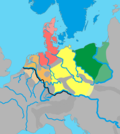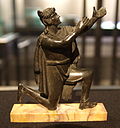Continental Germanic mythology formed an element within Germanic paganism as practiced in parts of Central Europe occupied by Germanic peoples up to and...
3 KB (285 words) - 20:25, 19 September 2024
Germanic mythology consists of the body of myths native to the Germanic peoples, including Norse mythology, Anglo-Saxon mythology, and Continental Germanic...
9 KB (973 words) - 19:50, 30 July 2024
forgotten at an early date. Anglo-Saxon paganism Continental Germanic mythology Frankish mythology Gothic paganism Old Norse religion Ancient Celtic...
128 KB (15,974 words) - 21:56, 23 December 2024
mythology Estonian mythology Finnish mythology Mari mythology Sami mythology Germanic mythology Anglo-Saxon mythology Continental Germanic mythology English...
8 KB (516 words) - 18:47, 6 December 2024
in Germanic paganism and Germanic mythology, both as individuals (sacred trees) and in groups (sacred groves). The central role of trees in Germanic religion...
18 KB (1,609 words) - 15:25, 1 January 2025
Germanic kingship is a thesis regarding the role of kings among the pre-Christianized Germanic tribes of the Migration period (c. 300–700 AD) and Early...
9 KB (1,164 words) - 01:49, 7 November 2024
Norse, Nordic, or Scandinavian mythology, is the body of myths belonging to the North Germanic peoples, stemming from Old Norse religion and continuing...
30 KB (3,611 words) - 21:50, 30 December 2024
Teutons (redirect from Teutons (Germanic tribe))
century BC. Some generations later, Julius Caesar compared them to the Germanic peoples of his own time, and used this term for all northern peoples located...
15 KB (1,845 words) - 10:01, 21 December 2024
in Germanic paganism. Both numbers (and multiples thereof) appear throughout surviving attestations of ancient Germanic folklore, in both mythology and...
7 KB (868 words) - 21:53, 19 February 2024
not in any Germanic vernacular, codes of Anglo-Saxon law were produced in Old English. The study of Anglo-Saxon and continental Germanic law codes has...
47 KB (5,889 words) - 07:48, 2 November 2024
In Germanic mythology, an idis (Old Saxon, plural idisi) is a divine female being. Idis is cognate to Old High German itis and Old English ides, meaning...
5 KB (690 words) - 20:35, 17 March 2024
Scandza (redirect from Mixi (Germanic tribe))
there was a land bridge which cut off the sea in the east forming the Germanic Sea". "There were also many small islands" (the Swedish and Finnish archipelagos)...
12 KB (1,428 words) - 15:10, 7 January 2025
The Germanic peoples underwent gradual Christianization in the course of late antiquity and the Early Middle Ages. By CE 700, England and Francia were...
18 KB (2,309 words) - 23:05, 5 January 2025
Proto-Germanic paganism was the beliefs of the speakers of Proto-Germanic and includes topics such as the Germanic mythology, legendry, and folk beliefs...
76 KB (1,948 words) - 19:31, 4 January 2025
In Germanic paganism, the indigenous religion of the ancient Germanic peoples who inhabit Germanic Europe, there were a number of different gods and goddesses...
21 KB (696 words) - 02:19, 21 December 2024
Anglo-Saxon paganism (redirect from Anglo-Saxon mythology)
Sarah Semple, 2010. While historical investigation into Germanic paganism and its mythology began in the seventeenth century with Peder Resen's Edda...
111 KB (15,046 words) - 20:05, 24 December 2024
movements across Europe, such as Roman mythology that spread through the Roman Empire, and Continental Germanic mythology. Pre-Christian traditions of the veneration...
31 KB (4,119 words) - 04:16, 23 November 2024
Germanic philology is the philological study of the Germanic languages, particularly from a comparative or historical perspective. The beginnings of research...
4 KB (356 words) - 21:40, 9 March 2024
English: dracan, Old Norse: dreki, Old High German: trahho) in the wider Germanic mythology and folklore, in which they are often portrayed as large venomous...
25 KB (2,560 words) - 08:33, 7 January 2025
Ingaevones (redirect from North Sea Germanic peoples)
The Ingaevones (Latin pronunciation: [ɪŋɡae̯ˈwoːneːs]) were a Germanic cultural group living in the Northern Germania along the North Sea coast in the...
8 KB (887 words) - 16:33, 9 August 2024
Pan-Germanism (redirect from Pan-Germanic)
Pangermanismus or Alldeutsche Bewegung), also occasionally known as Pan-Germanicism, is a pan-nationalist political idea. Pan-Germanists originally sought...
37 KB (3,996 words) - 14:10, 3 January 2025
throughout the territory occupied by Germanic-speaking peoples. Over the course of Late Antiquity, most continental Germanic peoples and the Anglo-Saxons of...
164 KB (20,237 words) - 22:30, 1 January 2025
Early Germanic culture was the culture of the early Germanic peoples. The Germanic culture started to exist in the Jastorf culture located along the central...
115 KB (14,608 words) - 03:24, 3 January 2025
(1983) The Prehistory of Germanic Europe, Ch. 6 "The Northern Genesis", 309–311. ISBN 0-300-02863-6 Lucien Musset, The Germanic Invasions, the Making of...
9 KB (933 words) - 20:39, 23 October 2024
(English: Great Germania), Germania Libera (English: Free Germania), or Germanic Barbaricum to distinguish it from the Roman provinces of Germania Inferior...
28 KB (2,948 words) - 15:00, 16 August 2024
Romans and various Germanic peoples. The nature of these wars varied through time between Roman conquest, Germanic uprisings, later Germanic invasions of the...
65 KB (6,498 words) - 20:49, 6 January 2025
studied by archaeologists. The Germanic Iron Age is divided into the Early Germanic Iron Age (EGIA) and the Late Germanic Iron Age (LGIA). It is particularly...
8 KB (1,007 words) - 11:38, 27 November 2024
The Germanic languages are a branch of the Indo-European language family spoken natively by a population of about 515 million people mainly in Europe,...
94 KB (9,575 words) - 07:54, 3 January 2025
continuity with a Germanic culture. Anti-Semitic folklore such as the blood libel legend was also emphasized. Continental Germanic mythology German Legends...
6 KB (712 words) - 11:14, 20 April 2024
List of mythological objects (redirect from Swords in mythology)
become invisible. Used by Alberich in Der Ring des Nibelungen. (Continental Germanic mythology) Goswhit, the helmet of King Arthur, passed down to him from...
190 KB (25,943 words) - 15:58, 7 January 2025
























